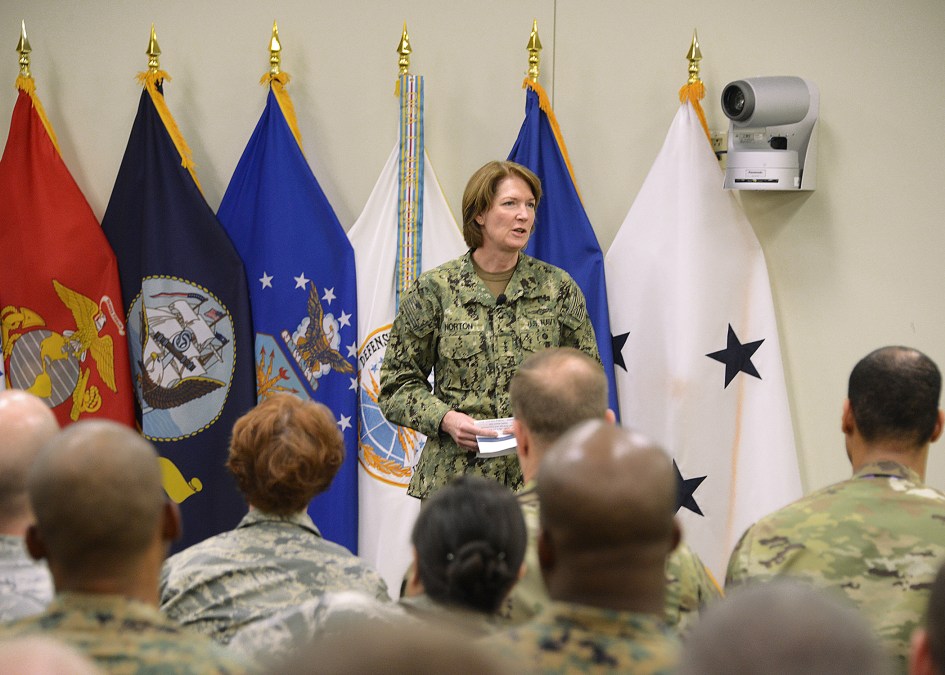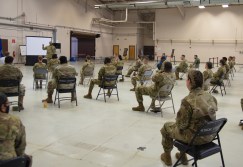In moving $8B DEOS contract to GSA, DISA looks to help non-defense agencies

The Pentagon’s $8 billion acquisition of commercial cloud back-office communication and collaboration services could be of great benefit not just to the military services, but civilian agencies as well.
Defense Information Systems Agency leaders said Monday at the agency’s Forecast to Industry that the Department of Defense’s recent decision to now acquire the Defense Enterprise Office Solution (DEOS) through the General Services Administration’s governmentwide IT Schedule 70 was driven in large part by DISA’s hope to open the resulting contract for use by the rest of the government at some point.
Asked during a media conference why DOD decided GSA’s Schedule 70 is the best way to acquire DEOS, DISA’s Brian Hermann told reporters, “It was a couple things. The first was the rest of the federal government has similar requirements to do what we’re trying to do to have commercial cloud vendors deliver these capabilities to them.”
The DEOS acquisition strategy has evolved since the first draft request for proposals was issued in April. GSA issued a request for information on behalf of DOD in late October to research the market availability of a “managed commercial cloud service, in which services provided will include enterprise hardware, software licenses, and deployment/sustainment services across the DoD enterprise,” according to the solicitation.
Vice Adm. Nancy Norton, director of DISA, recognized this as a need to do right by DISA’s industry partners and its federal partners.
“We have had a lot of interaction with industry throughout the whole development of DEOS in trying to understand how to shape that contract and ultimately deliver the best product for what could be well beyond the military services across all of DOD and other government spaces as well,” Norton told reporters. “And making sure that we get that right in a way that’s satisfactory to industry.”
Hermann, chief of DISA’s Enterprise Services Development Division, added that “the rest of the federal government wants to do the same things” with commercial cloud that DISA is looking to do with DEOS. “And they don’t necessarily have the same interoperability requirement with the Department of Defense,” he said. “So there could be additional offers or additional solutions that meet the needs of the entire federal government. But we don’t want to recreate the solution where we have common functional requirements.”
“With GSA in the procurement role, the ordering process for the entire federal government will be a little more standardized,” Hermann said.
Norton also seemed to welcome that some of the changes in the acquisition strategy may have been a response to the outrage DOD has seen connected the $10 billion single-award Joint Enterprise Defense Infrastructure (JEDI) acquisition, another commercial cloud contract the department is pursuing — albeit a much more high-profile one.
Originally, DEOS too was slated to be bid as a single-award contract. But now DOD, through GSA, plans to re-evaluate that decision based on the industry feedback it receives from the new RFI. The JEDI acquisition has seen several pre-award protests and heavy condemnation from commercial cloud vendors because DOD never wavered in its choice to eventually issue a single award for such a massive contract. It’s more than likely the same would’ve happened with DEOS if it were competed as a single-award contract as intended.
To Hermann, opening DEOS to greater industry feedback makes the entire acquisition a more commercial endeavor. “We don’t know necessarily what the right answer is on the single versus multi-award,” he told reporters. “And that’s very much, if you look at it, part of what we’re asking industry to tell us in the RFI that’s out there. I have some concerns about ensuring that the DOD gets exactly what it needs in terms of interoperability across the department. So we’re looking for industry to tell us how they solve that problem, not trying to dictate to them how we think you should solve that problem.”
Asked if DOD is leaning in favor of a single award or multiple award, Hermann said: “Not at all. We’re open to letting industry help us understand the best way to do that.”
He did offer a few details on what he expects, however. “It will not be… an [indefinite delivery, indefinite quantity contract], but it will include plenty of opportunities for partnering at all levels,” Hermann said on stage during a presentation on DISA’s upcoming contracting opportunities. “We know that, in fact, the migration support that is going to be required to move everybody in the Department of Defense over to these enterprise services are probably more than any single vendor could possibly do. And we’ve talked to a number of smaller firms that certainly have technical ability to improve those capabilities in the future. It’s going to be a Schedule 70 [blanket purchase agreement], and there will be lots of partnering opportunities under that.”
But outside of the new acquisition, “rest assured that the capability that we’re looking to acquire remains the same,” he said. “What it really means is that the rest of the federal government also has the same requirements and we’re going to try to use common vehicles to acquire those. The DOD has interoperability requirements, so we need to work closely together — other organizations may be able to actually pursue slightly different technical solutions but use the same vehicles. And so that’s a strategic shift that just helps us with some broader federal goals.”
So if DISA isn’t the agency leading the acquisition now, what part will it now play in developing DEOS, a capability that it created to modernize office productivity, unified communications and collaboration across the DOD?
“The program office at DISA will still continue to be the place where the Department of Defense ensures interoperability, cybersecurity, etc. and making sure that we integrate the capabilities that vendors bring with our existing infrastructure, enterprise directory services and cloud access points, etc., to make sure that our networks can actually consume those services that we know industry is prepared to offer,” Hermann said.
DISA wants to have initial task orders awarded under the contract in May 2019, Hermann said.
Responses to the new GSA RFI are due Nov. 9.




